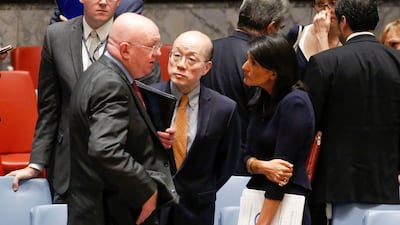North Korea is "begging for war" the United States said on Monday as it urged the UN Security Council to impose the "strongest possible measures" in response to Pyongyang's sixth and most powerful nuclear test.
US ambassador Nikki Haley said Washington would present a new sanctions resolution for discussion by the council and seek a vote on it next Monday.
"Only the strongest sanctions will enable us to resolve this problem through diplomacy," Ms Haley told an emergency meeting of the council.
The US, Britain, France, Japan and South Korea requested the meeting after North Korea on Sunday detonated what it described as a hydrogen bomb designed for a long-range missile.
Declaring that "enough is enough," Ms Haley said incremental sanctions imposed since 2006 had not worked and accused North Korean leader Kim Jong-un of "begging for war".
"War is never something the United States wants. We don't want it now. But our country's patience is not unlimited," she said.
"North Korea has basically slapped everyone in the face in the international community that has asked them to stop."
Ms Haley said the "time for half measures is over", but did not spell out what measures Washington would support.
___________________________________
Read more:
China fears North Korea is preparing to spoil Communist Party congress
North Korea may be setting a precedent for other rogue nations
_____________________________________
Diplomats have indicated that an oil embargo would have a crippling effect on the North Korean economy.
South Korea's defence ministry said Pyongyang may be preparing another missile launch after two tests in July of intercontinental ballistic missiles (ICBMs) believed to be capable of reaching much of the US mainland.
The new launch could involve an ICBM being fired into the Pacific Ocean, the ministry said.
China's ambassador to the UN, Liu Jieyi, told the security council meeting that "the situation on the peninsula is deteriorating constantly as we speak, falling into a vicious circle", but said the need was for dialogue and a diplomatic solution.
Mr Liu said China, North Korea's closest ally, would "never allow chaos and war on the peninsula".
He called for support for a Chinese and Russian proposal that the North halt its missile and nuclear tests in exchange for the US and South Korea suspending their annual joint military exercises.
Ms Haley rejected the proposal as "insulting".
"When a rogue regime has a nuclear weapon and an ICBM pointed at you, you do not take steps to lower your guard. No one would do that. We certainly won't," she said.
Russia said it would study the new US proposals for sanctions, but reiterated that such measures alone would not resolve the crisis.
"This is not the way to get parties to the table to seek a political solution," Russian ambassador Vassily Nebenzia said.
The council has imposed seven sets of sanctions on North Korea since it first tested a nuclear device in 2006, but Pyongyang has repeatedly found ways to circumvent the measures.
Its most recent sanctions have been significantly tougher, targeting key export sectors such as coal that are a source of hard currency for the North Korean regime.
Adding to already sharp tensions, the US defence secretary Jim Mattis warned on Sunday of a "massive military response" to any threats from North Korea, saying any new aggression against the US or its allies could lead to Pyongyang's "total annihilation".
The United States also said it might cut off all trade with any country doing business with North Korea, a move that would have the greatest ramifications for China as the largest trading partner of both the North and the US.
Many experts say talks may be the only way to address the issue.
"The Americans need to open a direct channel at a high level with the North Koreans," said John Delury of Yonsei University in Seoul. "That's the missing piece to all of this."
South Korea said it had deployed more launchers of the US-made THAAD missile defence system in response to Sunday's nuclear test, also fired an early-morning volley of ballistic missiles in a simulated attack on the North's nuclear test site.
US president Donald Trump and South Korean leader Moon Jae-in spoke on Monday and agreed to remove limits on the payload of the South's missiles, Seoul's presidential office said.
Seoul was previously restricted to a maximum warhead weight of 500 kilograms on its ballistic missiles, under a 2001 agreement with the United States.
South Korea's defence ministry officials estimated the strength of Sunday's blast at 50 kilotons - five times the strength of any previous detonation by the North — but did not confirm whether it was a hydrogen bomb.
But defence minister Song Young-moo said Seoul believed Pyongyang had succeeded in miniaturising its nuclear weapons to fit into an ICBM.
US monitors measured a powerful 6.3-magnitude earthquake near the North's main testing site on Sunday.
Pyongyang hailed the test as "a perfect success."
Hours before the test, the North released images of Kim Jong-un inspecting a device it called a "thermonuclear weapon with super explosive power" entirely made "by our own efforts and technology".
The respected 38 North website urged caution, saying the object pictured was probably "only a model mock-up".
The North says it needs nuclear weapons to defend itself against the threat of invasion, and analysts say it is seeking to strengthen its hand for any future negotiations with Washington.

